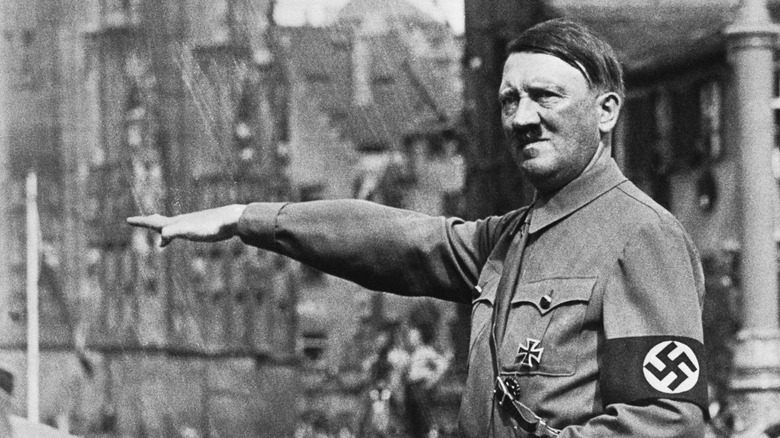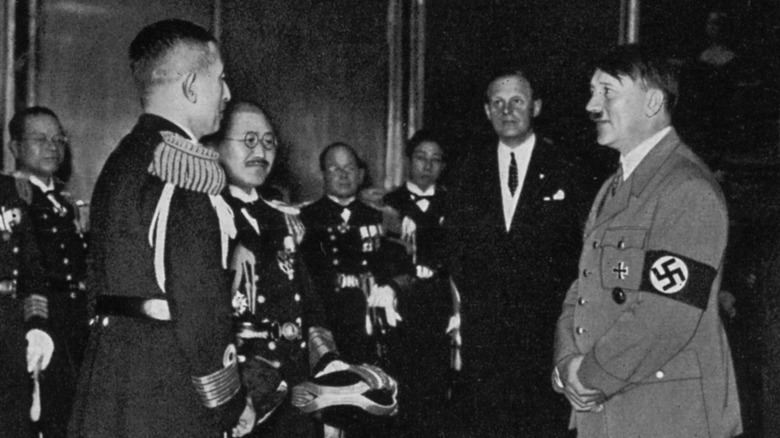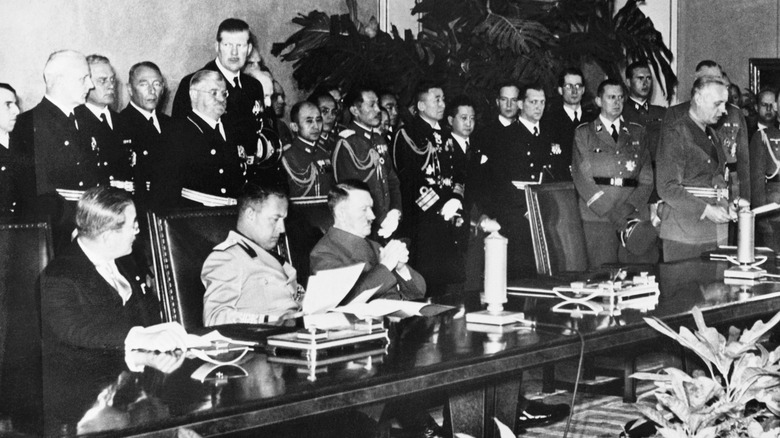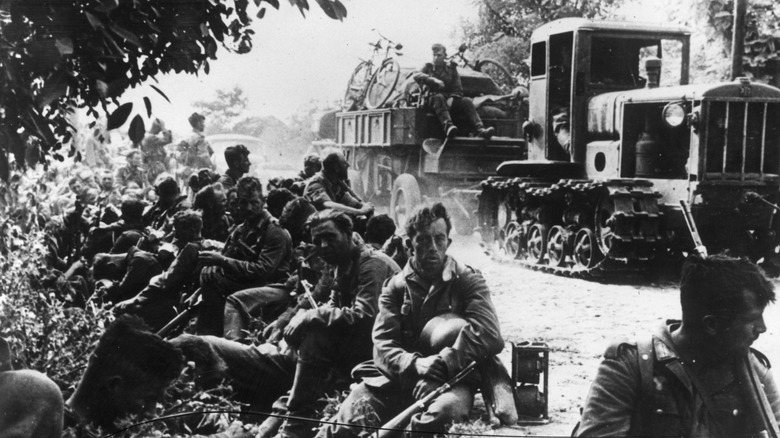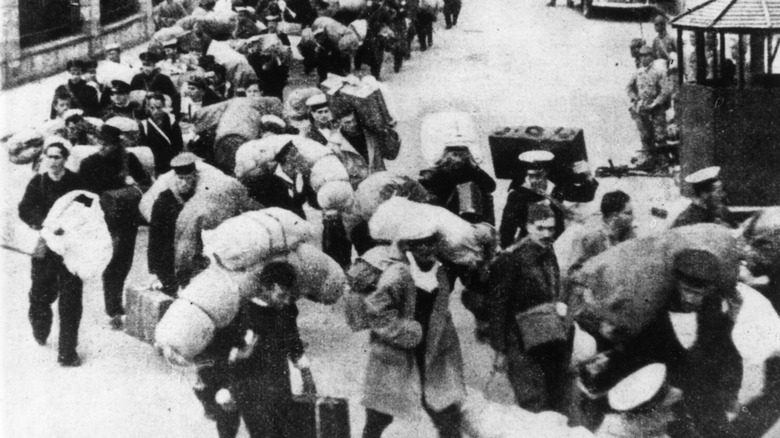These Were Hitler's Plans For Japan During And After WWII
Students learning about World War II for the first time might easily wonder why Japan would ally itself with the Axis Powers, and with Nazi Germany in particular. Wouldn't the racist ideology promoted by the Nazis preclude any nation with a people who didn't — and couldn't — fit into their conception of the "Aryan" race from working with them? And Imperial Japan had its own ideas on racial purity besides. What could have compelled such an alliance?
The truth is that Adolf Hitler himself pursued a partnership with Japan. Germany and Japan shared similar resentments toward other Western imperial powers, and both nations had concerns over Communist Russia. Hitler publicly praised the Chinese and Japanese people, at one point saying, "I have never regarded [them] as being inferior to ourselves ... [i]ndeed, I believe the more steadfast the Chinese and Japanese remain in their pride of race, the easier I shall find it to get on with them" (via German History in Documents and Images). Hitler's Germany and Japan would sign the Anti-Comintern Pact in 1936, and Japan would partner militarily with Germany and Italy in the Tripartite Pact of 1940.
But it's not hard to see the mental gymnastics Hitler went through to endorse partnering with Japan given his racial ideology. Japan's leaders, much like Benito Mussolini, had little time for Nazi race theory and in fact resisted Nazi pressure to turn over their Jewish population. And the alliance itself was a shallow one. Despite Hitler's qualified admiration for the Japanese, neither side of his partnership with them offered any real economic or military aid or coordination during World War II.
Hitler had an admiration for (his idea of) Japanese culture
Japan and Germany had an oscillating relationship throughout the late 19th and early 20th centuries. Statesmen of Meiji Japan admired the German Empire enough to pattern their constitution after it, but German interest in Japan was limited to nil before the Russo-Japanese War. Japan's defeat of a European power (with indirect help from Britain) made other nations sit up and take notice of the ascendant power in East Asia. German culture was soon inundated with admiring depictions of Japan and its people, though these depictions were heavily exoticized and stressed Japan's warrior past.
These were the images of Japan that shaped Adolf Hitler's thinking on his future ally. He supported Japan during the Russo-Japanese War and maintained his admiration for their conduct then in his notorious "Mein Kampf." But Hitler also seemed to be aware that his admiration ran afoul of his claims of Aryan superiority. His writings and public comments on the matter of Japan come across as a man trying to have his cake and eat it too, maintaining that the Aryans alone were "the founders of culture" while claiming that "[i]n a few decades ... the entire east of Asia will possess a culture whose ultimate foundation will be Hellenic spirit and Germanic technology, just as much as in Europe" (via The National WWII Museum New Orleans).
While maintaining Germany's profound influence on Japan in all essential matters throughout the 1920s, Hitler seems to have become more sincerely enamored of Japan after its turn to the hard right the following decade. His enthusiasm for an alliance was fueled by Japan's campaign against Manchuria.
Hitler agreed to Japanese territorial demands
There has been a great deal of speculation on what a hypothetical Nazi victory in World War II could have looked like — and what it could have meant for the world if Adolf Hitler had won. Hitler harbored dark, grandiose schemes for Europe, ranging from enslavement of native Russians in the east to restoring Edward VIII as a figurehead for a supplicated Britain. But when it came to Asia, Hitler appeared willing to defer to the eastern arm of the Axis powers.
According to Norman Rich's "Hitler's War Aims," Nazi Germany was hard-pressed to reconcile competing territorial aspirations on the part of its allies. Negotiations to divide real or anticipated spoils were laden with false promises and disingenuous suggestions by German diplomats to throw off potentially troublesome partners and further Hitler's larger aims. But Japan didn't wait for a questionable offer to come to them. As European powers fell to the Nazi war machine, the Japanese, without Hitler's support, seized European colonies in the Pacific.
Maintaining control of such colonies was a concern for those French and Dutch who collaborated with the Nazis, and losing a bargaining chip upset the Fuhrer. But Hitler considered maintaining the Japanese alliance more important than placating his European puppets by 1940, and he acquiesced, not just to the loss of the colonies (including Germany's own), but to the principle that Asia was Japan's exclusive sphere of influence. By 1942, the importance of Japan to Hitler's ambitions was even greater; they were his only stalwart military ally. By then, he was even prepared to countenance Japanese control of Australia and New Zealand.
Hitler hoped and anticipated that Japan would join him in war on the Soviet Union
The Tripartite Pact did not obligate Japan to cooperate or coordinate with Germany on international affairs. Nevertheless, when Adolf Hitler decided to attack the Soviet Union, he hoped that the Japanese would follow his lead. After all, both nations had longstanding worries over the communist turn taken in Russia.
Hitler's timing, however, was inconvenient. Just two months before his infamous Operation Barbarossa began in 1941, Japan and Russia reached an accord on a five-year neutrality agreement. It was hardly a warm gesture of peace and brotherhood; a major motivator for the accord was that it let Japan and Russia remove their respective troops from disputed parts of Manchuria to make war elsewhere. And those disputed territories had already driven the Japanese and Soviets into violent skirmishes that left Japan the worse for wear; it had no appetite for further conflict with its northeastern neighbor.
The U.S. entry into World War II later that year demanded even more of Japan's military resources, making an invasion of Russia even harder to contemplate. Ironically, Hitler seems to have actively encouraged Japan's aggressive Pacific actions that led to Pearl Harbor and America's decision to join the fray. Hitler was even delighted by the news of Pearl Harbor; even without Japan attacking Russia, he felt that the Pacific campaign would keep the Americans occupied while he finished off the Soviets.
Japan did not accept or participate in Germany's Holocaust
The Japanese government suppressed news coming out of Germany about the Holocaust as a gesture to its ally, one Germany was happy to reciprocate with its own censorship of Japanese atrocities in the Pacific. But if Imperial Japan was prepared to hide the truth about the Nazis from its own people, it wasn't prepared to cooperate with its ally's antisemitic campaign. It even explicitly and publicly rejected any cooperation in anti-Jewish activities.
That isn't to say Jewish people living in Japanese-controlled territory were free from hardship. White Jews, like all white people under Japanese control, were considered "gaijin," or foreigners, and were treated as such. Just what that treatment looked like could vary wildly; in Japan itself, foreign nationals were only taken into custody in the final months of World War II, while in the colonies, "gaijin" were herded into internment camps and subjected to potentially brutal treatment. But Jews in such camps were not singled out for particularly harsh measures. Japan also disregarded German demands to expunge Jewish influences on their culture or restrict the travel of Jewish communities in Shanghai.
Nazi propaganda about Jews did penetrate into some corners of Japanese society by World War II, and stateless Jewish refugees could be singled out for surveillance on account of their race. But Japan refused to expel these refugees from their territory throughout the course of the war.
